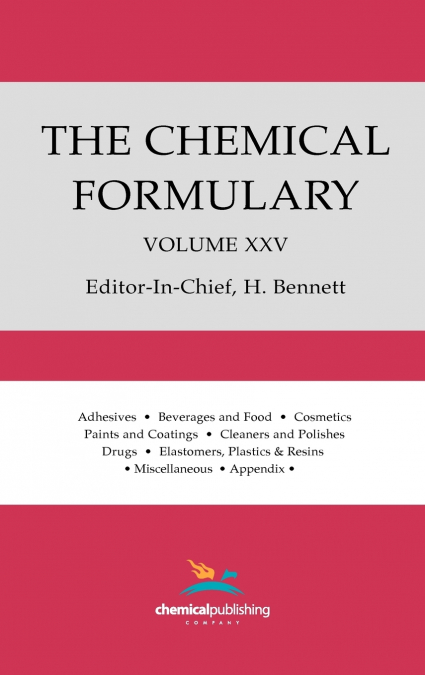
 Librería Desdémona
Librería Desdémona
 Librería Samer Atenea
Librería Samer Atenea
 Librería Aciertas (Toledo)
Librería Aciertas (Toledo)
 Kálamo Books
Kálamo Books
 Librería Perelló (Valencia)
Librería Perelló (Valencia)
 Librería Elías (Asturias)
Librería Elías (Asturias)
 Donde los libros
Donde los libros
 Librería Kolima (Madrid)
Librería Kolima (Madrid)
 Librería Proteo (Málaga)
Librería Proteo (Málaga)
There is hardly any technical library in the world in which the volumes of the Chemical Formulary (Volumes 1-34) do not occupy a prominent place. Chemists both experienced and beginner, continually refer to them. It does not duplicate any of the formulas included in previous volumes, but lists a wide array of modern and salable products from all branches of the chemical industries. An excellent reference for formulation problems. -CONTENTS - I. Introduction - II. Beverages and Foods - III. Coatings - IV. Cosmetics - V. Drug Products - VI. Detergents and Sanitizers - VII. Elastomers and Plastics - VIII. Metals - IX. Polishes - X. Textile Specialties - XI. Miscellaneous - Appendix - Index - PREFACE - Chemistry, as taught in our schools and colleges, concerns chiefly synthesis, analysis, and engineering-and properly so. It is part of the right foundation for the education of the chemist. Many a chemist entering an Industry soon finds that most of the products manufactured by his concern are not synthetic or definite complex compounds, but are mixtures, blends, or highly complex compounds of which he knows little or nothing. The literature in this field, if any, may be meager, scattered, or obsolete. Even chemists with years of experience In one or more Industries spend considerable time and effort in acquainting themselves with any new field which they may enter. Consulting chemists similarly have to solve problems brought to them from industries foreign to them. There was a definite need for an up-to-date compilation of formulae for chemical compounding and treatment. Since the fields to be covered are many and varied, an editorial board of chemists and engineers engaged in many industries was formed. Many publications, laboratories, manufacturing firms, and Individuals have been consulted to obtain the latest and best information. It is felt that the formulas given in this volume will save chemists and allied workers much time and effort. Manufacturers and sellers of chemicals will find, In these formulae, new uses for their products. Non-chemical executives, professional men, and Interested laymen will make through this volume a 'speaking acquaintance' with products which they may be using, trying or selling. It often happens that two Individuals using the same Ingredients in the same formula get different results. This may be due to slight deviations in the raw materials or unfamiliarity with the intricacies of a new technique. Accordingly, repeated experiments may be necessary to get the best results. Although many of the formulas given are being used commercially, many have been taken from the literature and may be subject to various errors and omissions. This should be taken into consideration. Wherever possible, it is advisable to consult with other chemists or technical workers regarding commercial production.